| Listing 1 - 7 of 7 |
Sort by
|
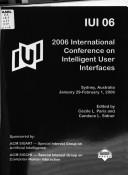
ISBN: 1595932879 9781595932877 Year: 2006 Publisher: New York (N.Y.) ACM Press
Abstract | Keywords | Export | Availability | Bookmark
 Loading...
Loading...Choose an application
- Reference Manager
- EndNote
- RefWorks (Direct export to RefWorks)
Human-computer interaction --- Artificial intelligence --- Engineering & Applied Sciences --- Computer Science --- 681.3*I2 <063> --- 681.3*I2 <063> Artificial intelligence. AI--Congressen --- Artificial intelligence. AI--Congressen --- 681.3*H52 <063> --- Information interfaces and presentation: user interfaces, input devices, input strategies, user interface management systems--Congressen --- Information Technology --- Computer Science (Hardware & Networks) --- Human-computer interaction - Congresses --- Artificial intelligence - Congresses
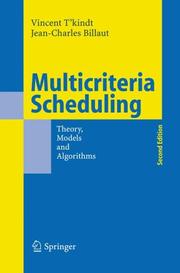
ISBN: 1280607912 9786610607914 3540247890 3540282300 3642444121 9783540282303 Year: 2006 Publisher: Berlin, Heidelberg : Springer Berlin Heidelberg : Imprint: Springer,
Abstract | Keywords | Export | Availability | Bookmark
 Loading...
Loading...Choose an application
- Reference Manager
- EndNote
- RefWorks (Direct export to RefWorks)
Scheduling and multicriteria optimisation theory have been subject, separately, to numerous studies. Since the last twenty years, multicriteria scheduling problems have been subject to a growing interest. However, a gap between multicriteria scheduling approaches and multicriteria optimisation field exits. This book is an attempt to collect the elementary of multicriteria optimisation theory and the basic models and algorithms of multicriteria scheduling. It is composed of numerous illustrations, algorithms and examples which may help the reader in understanding the presented concepts. This book covers general concepts such as Pareto optimality, complexity theory, and general method for multicriteria optimisation, as well as dedicated scheduling problems and algorithms: just-in-time scheduling, flexibility and robustness, single machine problems, parallel machine problems, shop problems, etc. The second edition contains revisions and new material.
Production scheduling. --- Multiple criteria decision making. --- Decision making with multiple objectives --- MCDM (Decision making) --- Multiattribute decisions --- Multicriteria decision analysis --- Multicriteria decision making --- Multicriteria decision making analysis --- Multiobjective decision making --- Multiple objective decision making --- Decision making --- Job scheduling (Production control) --- Job-shop scheduling --- Project scheduling (Production control) --- Scheduling (Management) --- Production control --- Scheduling --- Operations research. --- Operating systems (Computers). --- Production management. --- Operations Research/Decision Theory. --- Operating Systems. --- Operations Management. --- Manufacturing management --- Industrial management --- Computer operating systems --- Computers --- Disk operating systems --- Systems software --- Operational analysis --- Operational research --- Industrial engineering --- Management science --- Research --- System theory --- Operating systems --- Multiple criteria decision making --- Production scheduling --- 519.8 --- 681.3*F --- 681.3*I2 --- 681.3*F Theory of computation --- Theory of computation --- 519.8 Operational research --- 681.3*I2 Artificial intelligence. AI --- Artificial intelligence. AI --- Decision making. --- Deciding --- Decision (Psychology) --- Decision analysis --- Decision processes --- Making decisions --- Management --- Management decisions --- Choice (Psychology) --- Problem solving
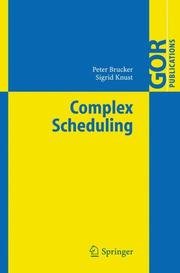
ISBN: 1280625716 9786610625710 3540295461 3540295453 3642067344 9783540295457 Year: 2006 Publisher: Berlin, Heidelberg : Springer Berlin Heidelberg : Imprint: Springer,
Abstract | Keywords | Export | Availability | Bookmark
 Loading...
Loading...Choose an application
- Reference Manager
- EndNote
- RefWorks (Direct export to RefWorks)
Scheduling problems have been investigated since the late ?fties. Two types of applications have mainly motivated research in this area: project planning and machine scheduling. While in machine scheduling a large number of speci?c scheduling situations depending on the machine environment and the job c- racteristicshavebeenconsidered, theearlyworkinprojectplanninginvestigated scheduling situations with precedence constraints between activities assuming that su?cient resources are available to perform the activities. More recently, in project scheduling scarce resources have been taken into account leading to so-called resource-constrained project scheduling problems. On the other hand, also in machine scheduling more general and complex problems have been - vestigated. Due to these developments today both areas are much closer to each other. Furthermore, applications like timetabling, rostering or industrial scheduling are connected to both areas. This book deals with such complex scheduling problems and methods to solve them. It consists of three parts: The ?rst part (Chapters 1 and 2) contains a description of basic scheduling models with applications and an introduction into discrete optimization (covering complexity, shortest path algorithms, linear programming, network ?ow algorithms and general optimization methods). In the second part (Chapter 3) resource-constrained project scheduling problems are considered. Especially, methods like constraint propagation, branch-a- bound algorithms and heuristic procedures are described. Furthermore, lower bounds and general objective functions are discussed.
Computer capacity --- Production scheduling --- Computer algorithms. --- Planning. --- Mathematical models. --- Algorithms --- Job scheduling (Production control) --- Job-shop scheduling --- Project scheduling (Production control) --- Scheduling (Management) --- Production control --- Scheduling --- Operations research. --- Computer software. --- Algorithms. --- Operations Research/Decision Theory. --- Operations Research, Management Science. --- Algorithm Analysis and Problem Complexity. --- Algorism --- Algebra --- Arithmetic --- Software, Computer --- Computer systems --- Operational analysis --- Operational research --- Industrial engineering --- Management science --- Research --- System theory --- Foundations --- Computer algorithms --- 519.8 --- 681.3*F --- 681.3*I2 --- 681.3*I2 Artificial intelligence. AI --- Artificial intelligence. AI --- 681.3*F Theory of computation --- Theory of computation --- 519.8 Operational research --- Planning --- Mathematical models --- Decision making. --- Management science. --- Quantitative business analysis --- Management --- Problem solving --- Operations research --- Statistical decision --- Deciding --- Decision (Psychology) --- Decision analysis --- Decision processes --- Making decisions --- Management decisions --- Choice (Psychology) --- Decision making
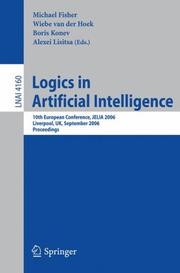
ISBN: 9783540396253 354039625X 3540396276 Year: 2006 Publisher: Berlin, Heidelberg : Springer Berlin Heidelberg : Imprint: Springer,
Abstract | Keywords | Export | Availability | Bookmark
 Loading...
Loading...Choose an application
- Reference Manager
- EndNote
- RefWorks (Direct export to RefWorks)
Artificial intelligence --- Logic, Symbolic and mathematical --- Intelligence artificielle --- Logique symbolique et mathématique --- Congresses. --- Congrès --- Computer Science --- Mechanical Engineering - General --- Engineering & Applied Sciences --- Mechanical Engineering --- 681.3*I2 --- 681.3*F41 --- 681.3*D16 --- Artificial intelligence. AI --- Mathematical logic: computability theory; computational logic; lambda calculus; logic programming; mechanical theorem proving; model theory; proof theory;recursive function theory--See also {681.3*F11}; {681.3*I22}; {681.3*I23} --- Programming techniques: Logic programming --- Information Technology --- Artificial Intelligence --- 681.3*F41 Mathematical logic: computability theory; computational logic; lambda calculus; logic programming; mechanical theorem proving; model theory; proof theory;recursive function theory--See also {681.3*F11}; {681.3*I22}; {681.3*I23} --- 681.3*I2 Artificial intelligence. AI --- Computer science. --- Computer programming. --- Mathematical logic. --- Artificial intelligence. --- Computer Science. --- Artificial Intelligence (incl. Robotics). --- Programming Techniques. --- Mathematical Logic and Formal Languages. --- AI (Artificial intelligence) --- Artificial thinking --- Electronic brains --- Intellectronics --- Intelligence, Artificial --- Intelligent machines --- Machine intelligence --- Thinking, Artificial --- Bionics --- Cognitive science --- Digital computer simulation --- Electronic data processing --- Logic machines --- Machine theory --- Self-organizing systems --- Simulation methods --- Fifth generation computers --- Neural computers --- Algebra of logic --- Logic, Universal --- Mathematical logic --- Symbolic and mathematical logic --- Symbolic logic --- Mathematics --- Algebra, Abstract --- Metamathematics --- Set theory --- Syllogism --- Computers --- Electronic computer programming --- Electronic digital computers --- Programming (Electronic computers) --- Coding theory --- Informatics --- Science --- Programming --- Artificial Intelligence. --- JELIA
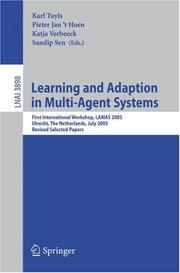

ISBN: 9783540330530 3540330534 3540330593 Year: 2006 Publisher: Berlin, Heidelberg : Springer Berlin Heidelberg : Imprint: Springer,
Abstract | Keywords | Export | Availability | Bookmark
 Loading...
Loading...Choose an application
- Reference Manager
- EndNote
- RefWorks (Direct export to RefWorks)
This book contains selected and revised papers of the International Workshop on Lea- ing and Adaptation in Multi-Agent Systems (LAMAS 2005), held at the AAMAS 2005 Conference in Utrecht, The Netherlands, July 26. An important aspect in multi-agent systems (MASs) is that the environment evolves over time, not only due to external environmental changes but also due to agent int- actions. For this reason it is important that an agent can learn, based on experience, and adapt its knowledge to make rational decisions and act in this changing environment autonomously. Machine learning techniques for single-agent frameworks are well established. Agents operate in uncertain environments and must be able to learn and act - tonomously. This task is, however, more complex when the agent interacts with other agents that have potentially different capabilities and goals. The single-agent case is structurally different from the multi-agent case due to the added dimension of dynamic interactions between the adaptive agents. Multi-agent learning, i.e., the ability of the agents to learn how to cooperate and compete, becomes crucial in many domains. Autonomous agents and multi-agent systems (AAMAS) is an emerging multi-disciplinary area encompassing computer science, software engineering, biology, as well as cognitive and social sciences. A t- oretical framework, in which rationality of learning and interacting agents can be - derstood, is still under development in MASs, although there have been promising ?rst results.
Machine learning --- Distributed artificial intelligence --- Electronic data processing --- Apprentissage automatique --- Intelligence artificielle répartie --- Traitement réparti --- Congresses. --- Distributed processing --- Congrès --- Computer Science --- Mechanical Engineering - General --- Engineering & Applied Sciences --- Mechanical Engineering --- 681.3*I2 --- 681.3*I21 --- Artificial intelligence. AI --- Applications and expert systems (Artificial intelligence). Cartography. Games. Industrial automation. Law. Medicine and science. Natural language interfaces. Office automation--See also {681.3*H4}; {681.3*J} --- Conferences - Meetings --- Information Technology --- Artificial Intelligence --- 681.3*I21 Applications and expert systems (Artificial intelligence). Cartography. Games. Industrial automation. Law. Medicine and science. Natural language interfaces. Office automation--See also {681.3*H4}; {681.3*J} --- 681.3*I2 Artificial intelligence. AI --- Computer science. --- Computer communication systems. --- Artificial intelligence. --- Computer Science. --- Artificial Intelligence (incl. Robotics). --- Computer Communication Networks. --- AI (Artificial intelligence) --- Artificial thinking --- Electronic brains --- Intellectronics --- Intelligence, Artificial --- Intelligent machines --- Machine intelligence --- Thinking, Artificial --- Bionics --- Cognitive science --- Digital computer simulation --- Logic machines --- Machine theory --- Self-organizing systems --- Simulation methods --- Fifth generation computers --- Neural computers --- Communication systems, Computer --- Computer communication systems --- Data networks, Computer --- ECNs (Electronic communication networks) --- Electronic communication networks --- Networks, Computer --- Teleprocessing networks --- Data transmission systems --- Digital communications --- Electronic systems --- Information networks --- Telecommunication --- Cyberinfrastructure --- Network computers --- Informatics --- Science --- Artificial Intelligence. --- Multi-agent systems --- LAMAS --- Autonomous agents --- AAMAS
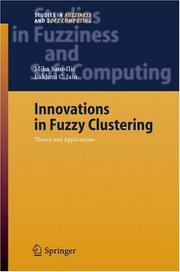
ISBN: 9783540343561 3540343563 9786610657209 1280657200 3540343571 Year: 2006 Volume: v. 205 Publisher: Berlin, Germany ; New York, New York : Springer,
Abstract | Keywords | Export | Availability | Bookmark
 Loading...
Loading...Choose an application
- Reference Manager
- EndNote
- RefWorks (Direct export to RefWorks)
There is a great interest in clustering techniques due to the vast amount of data generated in every field including business, health, science, engineering, aerospace, management and so on. It is essential to extract useful information from the data. Clustering techniques are widely used in pattern recognition and related applications. The research monograph presents the most recent advances in fuzzy clustering techniques and their applications. The following contents are included: Introduction to Fuzzy Clustering Fuzzy Clustering based Principal Component Analysis Fuzzy Clustering based Regression Analysis Kernel based Fuzzy Clustering Evaluation of Fuzzy Clustering Self-Organized Fuzzy Clustering This book is directed to the computer scientists, engineers, scientists, professors and students of engineering, science, computer science, business, management, avionics and related disciplines.
Fuzzy sets. --- Fuzzy logic. --- Fuzzy mathematics. --- Data mining. --- Soft computing. --- Ensembles flous --- Logique floue --- Mathématiques floues --- Exploration de données (Informatique) --- Informatique douce --- Fuzzy sets --- Fuzzy logic --- Fuzzy mathematics --- Data mining --- Soft computing --- Mathematics --- Civil & Environmental Engineering --- Engineering & Applied Sciences --- Physical Sciences & Mathematics --- Algebra --- Civil Engineering --- Applied Mathematics --- 681.3*I2 --- Artificial intelligence. AI --- 681.3*I2 Artificial intelligence. AI --- Algorithmic knowledge discovery --- Factual data analysis --- KDD (Information retrieval) --- Knowledge discovery in data --- Knowledge discovery in databases --- Mining, Data --- Nonlinear logic --- Sets, Fuzzy --- Mathematics. --- Artificial intelligence. --- Mathematical logic. --- Applied mathematics. --- Engineering mathematics. --- Mathematical Logic and Foundations. --- Appl.Mathematics/Computational Methods of Engineering. --- Artificial Intelligence (incl. Robotics). --- Electronic data processing --- Set theory --- Logic, Symbolic and mathematical --- Fuzzy systems --- Database searching --- Cognitive computing --- Computational intelligence --- Logic, Symbolic and mathematical. --- Mathematical and Computational Engineering. --- Artificial Intelligence. --- AI (Artificial intelligence) --- Artificial thinking --- Electronic brains --- Intellectronics --- Intelligence, Artificial --- Intelligent machines --- Machine intelligence --- Thinking, Artificial --- Bionics --- Cognitive science --- Digital computer simulation --- Logic machines --- Machine theory --- Self-organizing systems --- Simulation methods --- Fifth generation computers --- Neural computers --- Engineering --- Engineering analysis --- Mathematical analysis --- Algebra of logic --- Logic, Universal --- Mathematical logic --- Symbolic and mathematical logic --- Symbolic logic --- Algebra, Abstract --- Metamathematics --- Syllogism
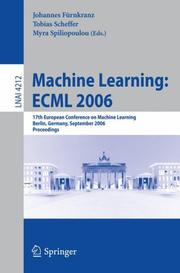
ISBN: 9783540453758 354045375X 354046056X Year: 2006 Publisher: Berlin New York : Springer,
Abstract | Keywords | Export | Availability | Bookmark
 Loading...
Loading...Choose an application
- Reference Manager
- EndNote
- RefWorks (Direct export to RefWorks)
Machine learning --- Apprentissage automatique --- Congresses. --- Congrès --- Computer Science --- Mechanical Engineering - General --- Mechanical Engineering --- Engineering & Applied Sciences --- 681.3*I26 <063> --- 681.3*I2 --- 681.3*F22 --- 681.3*F41 --- 681.3*H28 --- Learning: analogies; concept learning; induction; knowledge acquisition; language acquisition; parameter learning (Artificial intelligence)--See also {681.3*K32}--Congressen --- Artificial intelligence. AI --- Nonnumerical algorithms and problems: complexity of proof procedures; computations on discrete structures; geometrical problems and computations; pattern matching --See also {?681.3*E2-5}; {681.3*G2}; {?681.3*H2-3} --- Mathematical logic: computability theory; computational logic; lambda calculus; logic programming; mechanical theorem proving; model theory; proof theory;recursive function theory--See also {681.3*F11}; {681.3*I22}; {681.3*I23} --- Database applications --- Conferences - Meetings --- 681.3*I2 <063> --- 681.3*H2 <063> --- 681.3*J2 <063> --- 681.3*H3 <063> --- 681.3*G3 <063> --- 681.3*I7 <063> --- 681.3*F42 <063> --- Artificial intelligence. AI--Congressen --- Database management: security; integrity; protection--See also {?681.5*E5}--Congressen --- Physical sciences and engineering (Computer applications)--Congressen --- Information storage and retrieval--Congressen --- Probability and statistics: probabilistic algorithms (including Monte Carlo);random number generation; statistical computing; statistical software (Mathematics of computing)--Congressen --- Text processing (Computing methodologies)--See also {681.3*H4}--Congressen --- Grammars and other rewriting systems: decision problems; grammar types; parallel rewriting systems; parsing; thue systems (Mathematical logic and formal languages)--See also {681.3*D31}--Congressen --- Information Technology --- Artificial Intelligence --- 681.3*H28 Database applications --- 681.3*F41 Mathematical logic: computability theory; computational logic; lambda calculus; logic programming; mechanical theorem proving; model theory; proof theory;recursive function theory--See also {681.3*F11}; {681.3*I22}; {681.3*I23} --- 681.3*F22 Nonnumerical algorithms and problems: complexity of proof procedures; computations on discrete structures; geometrical problems and computations; pattern matching --See also {?681.3*E2-5}; {681.3*G2}; {?681.3*H2-3} --- 681.3*I2 Artificial intelligence. AI --- 681.3*I26 <063> Learning: analogies; concept learning; induction; knowledge acquisition; language acquisition; parameter learning (Artificial intelligence)--See also {681.3*K32}--Congressen --- 681.3*J2 <063> Physical sciences and engineering (Computer applications)--Congressen --- 681.3*I2 <063> Artificial intelligence. AI--Congressen --- Computer science. --- Algorithms. --- Mathematical logic. --- Database management. --- Artificial intelligence. --- Computer Science. --- Artificial Intelligence (incl. Robotics). --- Algorithm Analysis and Problem Complexity. --- Mathematical Logic and Formal Languages. --- Database Management. --- AI (Artificial intelligence) --- Artificial thinking --- Electronic brains --- Intellectronics --- Intelligence, Artificial --- Intelligent machines --- Machine intelligence --- Thinking, Artificial --- Bionics --- Cognitive science --- Digital computer simulation --- Electronic data processing --- Logic machines --- Machine theory --- Self-organizing systems --- Simulation methods --- Fifth generation computers --- Neural computers --- Informatics --- Science --- Data base management --- Data services (Database management) --- Database management services --- DBMS (Computer science) --- Generalized data management systems --- Services, Database management --- Systems, Database management --- Systems, Generalized database management --- Algebra of logic --- Logic, Universal --- Mathematical logic --- Symbolic and mathematical logic --- Symbolic logic --- Mathematics --- Algebra, Abstract --- Metamathematics --- Set theory --- Syllogism --- Algorism --- Algebra --- Arithmetic --- Foundations --- Computer software. --- Artificial Intelligence. --- Software, Computer --- Computer systems
| Listing 1 - 7 of 7 |
Sort by
|

 Search
Search Feedback
Feedback About
About Help
Help News
News